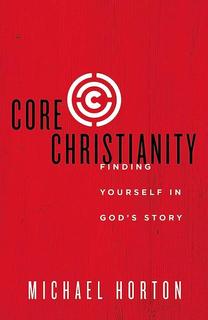According to reports, Prince Charles intends—if he ever ascends the British throne—to change his title from “Defender of the Faith” to “Defender of Faith.” What’s the loss in dropping a definite article? Everything, actually—the traditional title refers to the defense of a particular confession, a body of doctrine concerning the Triune God who has rescued us from our sins by the incarnation, life, death, and resurrection of the Son, Jesus Christ. With the proposed change, the intention is to encourage the act of faith—regardless of the object.
In fact, making faith itself the object of faith is just another way of believing in yourself. The important thing is the integrity, sincerity and strength of your believing. “But she really believes it,” we say when someone challenges the view of a friend. Well, then, if she really believes it, who am I to question?
From “the Faith” to “Faith”
The first thing we have to do when talking to people today is move the central truths of the Christian faith from the category of “faith” (understood as a mere leap based on will) to “truth” (understood as an objective state of affairs). The apostle Paul did not say that the most important stuff in religion is true regardless of whether Christ was raised; on the contrary, he insisted that if Christ was not raised, then our faith is futile, we are still in our sins, we have lied about God, and “we are of all people most to be pitied” (1 Cor. 15:12–19). There is nothing left of Christianity if Christ has not been raised and, consequently, no reason at all to be religious. The Christian faith is based not on faith—that is, on the subjective religiosity and sincerity of pious individuals—but on historical events of saving significance.
Faith in Christ as Known in the Faith
To counter both of these extremes, it is important to follow the classic distinction between the faith that is believed (fides quae creditur) and the faith that believes (fides qua creditur). Sometimes the Bible speaks of “the faith once and for all delivered unto the saints” (Jude 1:3; cf. Acts 6:7; Phil. 1:27; 1 Tim. 6:12; Titus 1:4), and at other times understands faith as the human act of trusting in the gospel. In Scripture, our personal act of faith is directed to the objective person and work of Christ as he is clothed in his gospel. My faith is determined by the faith that is believed everywhere and at all times by all Christians. However, most people on the street today would say that one’s subjective act of faith has nothing to do with the object. The significance of faith becomes determined entirely by the quality of our choosing rather than on the quality of what is chosen.
So it is important to see that faith, according to Scripture, is not less than knowledge but is more than belief in the truth of certain doctrines. The Reformers recognized from Scripture that faith includes three elements: knowledge, assent, and trust. It involves knowledge, to be sure—even in our natural relationships, we can hardly claim to know loved ones without knowing anything about them. “I want to know Jesus, not about Jesus,” we sometimes hear. But we do not talk like that about anyone else we care about. We recognize that we grow in our relationships with people we love the more we know about them. The Reformers also acknowledged that faith involves assent. We not only know the claims that God is triune and that Jesus died for our sins, but we also acknowledge these claims as true. But the ultimate aim of such knowledge and assent is trust. Christ not only died and was raised, but he was crucified and rose again for me. Scripture does not say that faith is our righteousness, but that Christ is our righteousness. Even the weakest faith embraces the strongest Savior.
Faith is, therefore, knowledge, but it is personal knowledge—that is, it is a personal act of knowing another person. To trust an oncologist to diagnose and treat your cancer, you have to be convinced of his or her trustworthiness. You can’t just tell yourself, “I have to just believe.” If the physician is worthy of your trust, then the more you know about the doctor, the stronger your confidence in him or her. And, of course, the opposite is true as well: if the doctor is not worthy of your confidence, then your trust weakens by investigating his or her credentials and track record. Throughout the Psalms, we discover reviews of God’s triumphs, which reveal his character and lead us to deeper confidence in his saving power. The more we learn about what God has done and who he is, the more our faith grows.
Therefore, we should avoid both extremes: on one hand, imagining that faith in God is possible apart from factual knowledge; on the other hand, reducing faith to factual knowledge.
Faith is Not Our Work
Finally, we need to remind ourselves that faith is the gift of God. We are born into this world not merely sick but “dead in trespasses and sins” (Eph. 2:1):
But God, being rich in mercy, because of the great love with which he loved us, even when we were dead in our trespasses, made us alive together with Christ—by grace you have been saved—and raised us up with him and seated us with him in the heavenly places in Christ Jesus, so that in the coming ages he might show the immeasurable riches of his grace in kindness toward us in Christ Jesus. For by grace you have been saved through faith. And this is not your own doing; it is the gift of God, not a result of works, so that no one may boast. (Eph. 2:4–9; italics added)
We are so clever at transforming good news about something God has done into a work for us to perform in order to get God to do something, that we can even turn faith into the “one little thing” we did in order to help God save us. It is not surprising that Christians who have been taught this message eventually begin to question the adequacy of their faith. The irony is that faith actually becomes stronger when we look away from ourselves and our faith to Christ as the only proper object. The more we hear and understand concerning the gospel, the more our faith grows and strengthens. Nevertheless, the weakest faith clings to a sufficient Savior. Faith does not save us from judgment any more than it saves us from drowning when a lifeguard carries us to safety. In both cases, it is the rescuer, not the one rescued, who is praised.
Adapted from Michael Horton,"True Faith" Modern Reformation, Jul/Aug 2017. Used by permission.






